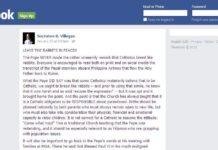ONE CATHOLIC apologist got it right when he said that it’s not a rock star who’s coming to visit the Philippines this week, but the “Rock.” Pope Francis is the successor of Peter, the rock on which Christ built His Church.
Francis will probably be the first to frown upon seeing how some have tried to make this apostolic journey solely about his personality, despite injunctions from himself and other Church leaders to keep the focus on Christ.
The public, and the media’s, preoccupation for celebrity is probably what’s feeding into numerous false ideas and statements attributed to the Argentine Pope. Last month, the country’s top TV network had to pull out shirts saying “No race. No religion. I embrace diversity” after backlash from Catholic netizens. Another shirt that says “Ganito ako, ganyan ka. Who am I to judge?” was pulled out much later.
Those who haven’t followed the Holy Father closely can easily fall prey to efforts by some sectors to try to hijack the Pope’s message and advance their agenda. The papal visit should be the occasion for Filipino Christians to discover Pope Francis’ message and rediscover their Catholic faith.
No religion? Just last Sunday, during the Feast of the Lord’s baptism, Pope Francis said in his homily: “Teach your children that there can be no Christian outside of the Church, you cannot follow Jesus Christ without the Church, because the Church is a mother, and makes us grow in love with Jesus Christ.” These are tough words.
Pope Francis’ famous rhetorical question “Who am I to judge?” has lost its context and has been appropriated by various quarters to mean practically anything, thanks to media’s shallow reporting on the papacy and Church affairs in general.
The statement came from an airborne press conference in 2013 following the successful Rio World Youth Day festivities. Francis was asked why he appointed a cleric with a record of sexual indiscretions to a sensitive Vatican post. His answer was classic Christian teaching on giving sinners, which we all are, second chances preconditioned on repentance. “If someone is gay and is searching for the Lord and has goodwill, who am I to judge him?”
To be sure, Jorge Mario Bergoglio is a pope who is not afraid to shake things up. He will not preach to the choir. His Christmas message to the Curia was a listing of their “sins.” The Holy Father is critical of cardinals and bishops who live like princes, and priests whose rooms look like bachelor’s pads. He disdains those who live double lives, and those who insist solely on the application of dogmas without offering concrete and pastoral solutions. His message: being Christian is not easy, and we should help and pray for one another.
Pope Francis may yet turn his popularity into a potent force for good. Many Christians who have gone astray are taking a second look at the Church and now feel more welcome.
His openness has garnered him the adoration of the youth. Here is a Pope who understands, one who does not hide behind the walls of the Vatican and instead readily embraces those who seek the Lord.
“The object is not to change the doctrine, but is a matter of going into the issue in depth and to ensure that the pastoral ministry takes into account the situations of each person,” Pope Francis said in an interview last March 5 with Italy’s Corriere della Sera.
With Francis, the very top of the Church hierarchy is stepping down from the pedestal to actively seek those who are confused and abandoned—actions needed at a time when technology poses as a rival to the proclamation of the Gospel.
That a pope is visiting UST for the fourth time sends a message to the Thomasian community to take seriously the mission of a Pontifical University to help the Holy Father spread the Gospel. A Catholic university is “born from the heart of the Church,” and amid an increasingly secular society, should stand as a witness to the truth offered by Christ through his Church.
As he visits the country, we can only expect more of the so-called “Francis effect.” But it is important to be reminded that Pope Francis is only an instrument of God. It is not about who leads the flock, but how the flock learns to stand for the faith as it fights the daily struggle for holiness.










